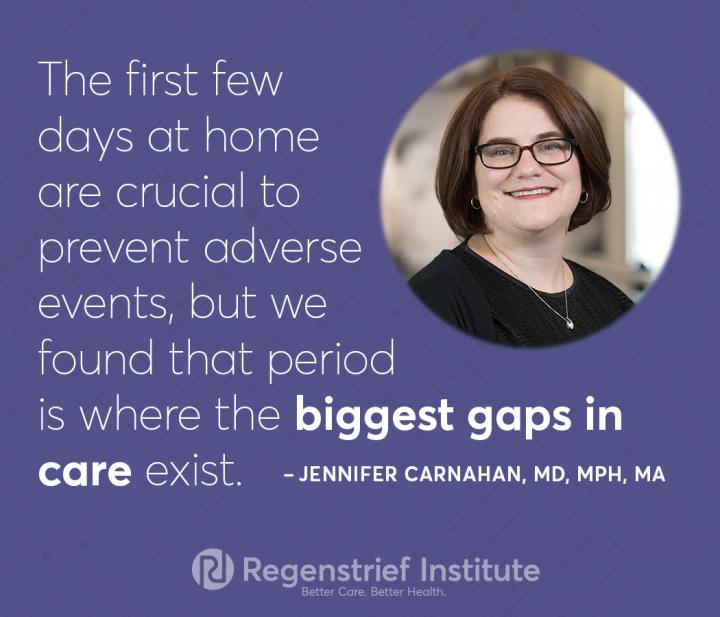Research especially important as COVID-19 creates new challenges in care transitions

Credit: Regenstrief Institute
INDIANAPOLIS — Returning home after a stay in the hospital and a skilled nursing facility is often overwhelming. New research from Regenstrief Institute and Indiana University shows that individualized treatment plans and instructions would be beneficial to both patients and their caregivers.
“Patients who are discharged from the hospital to a nursing facility before being able to go home are an extremely vulnerable population,” said Jennifer Carnahan, M.D., MPH, M.A., who is the study’s first author, a research scientist at Regenstrief Institute and an assistant professor of medicine at Indiana University School of Medicine. “These patients often have more comorbidities and medically complex situations. The first few days at home are crucial to prevent adverse events, but we found that period is where the biggest gaps in care exist.”
Care transitions are burdensome for patients and are the points in time where errors and gaps in care are more likely. The transitions can affect quality of life and cause the patient to lose progress made during their stay at the care facility.
The research team interviewed two dozen patients and 15 caregivers about their experience returning home after spending time in the hospital and then a skilled nursing facility. The patients reported not having enough information about plans for the transition in care. They found informational paperwork they received overwhelming or not useful. Many had challenges managing medication, and some experienced a gap in physical and occupational therapy.
“I think I’ve missed the therapy … I’ve gotten kind of stiff and everything so I think if we could have started the therapy sooner it would have been better,” one patient told researchers.
“We need to develop a way to bridge this gap between nursing facilities and the home environments to set individuals up for a successful transition and a return to their normal lives,” said Dr. Carnahan. “Patients need very tailored and specific instructions, because they face many changes and adjustments.
“COVID-19 has exacerbated nearly all of these transitional challenges,” she continued. “It will be hard to meet face to face; occupational therapy may be difficult due to restrictions or risk of exposure to the virus. These are issues we need to consider moving forward in these transitions.”
Dr. Carnahan is currently conducting research on an intervention that provides nurses to communicate treatment plans to patients and their caregivers and facilitate the necessary steps, whether it’s helping to schedule doctors’ appointments or making sure patients have proper medications.
###
“Complex Transitions from Skilled Nursing Facility to Home: Patient and Caregiver Perspectives” was published online in the Journal of General Internal Medicine ahead of print. The work was supported by grant numbers KL2TR002530 and UL1TR002529 from the National Institutes of Health, National Center for Advancing Translational Sciences, Clinical and Translational Sciences Award, National Institute on Aging of the National Institutes of Health Award Number K23AG062797 and the Regenstrief Foundation.
Additional authors on this paper are Alexia M. Torke, M.D., M.S. of Regenstrief Institute, IU School of Medicine, IU School of Nursing, IU Melvin and Bren Simon Comprehensive Cancer Center and the Daniel F. Evans Center for Spiritual and Religious Values in Healthcare; Lev Inger of Parkview Research Center and formerly of Regenstrief Institute; Susan Rawl, PhD, RN of IU School of Nursing and the Simon Cancer Center; Tochukwu C.Iloabuchi,M.D. of IU School of Medicine; Daniel O. Clark, PhD, and Christopher M. Callahan, M.D., of Regenstrief Institute and IU School of Medicine.
About Regenstrief Institute
Founded in 1969 in Indianapolis, the Regenstrief Institute is a local, national and global leader dedicated to a world where better information empowers people to end disease and realize true health. A key research partner to Indiana University, Regenstrief and its research scientists are responsible for a growing number of major healthcare innovations and studies. Examples range from the development of global health information technology standards that enable the use and interoperability of electronic health records to improving patient-physician communications, to creating models of care that inform practice and improve the lives of patients around the globe.
Sam Regenstrief, a nationally successful entrepreneur from Connersville, Indiana, founded the institute with the goal of making healthcare more efficient and accessible for everyone. His vision continues to guide the institute’s research mission.
About IU School of Medicine
IU School of Medicine is the largest medical school in the U.S. and is annually ranked among the top medical schools in the nation by U.S. News & World Report. The school offers high-quality medical education, access to leading medical research and rich campus life in nine Indiana cities, including rural and urban locations consistently recognized for livability.
Jennifer Carnahan, M.D., MPH, M.A.
In addition to her role as a research scientist at IU Center for Aging Research at Regenstrief Institute, Jennifer Carnahan, M.D., MPH, M.A., is an assistant professor of medicine at IU School of Medicine.
Media Contact
Cindy Fox Aisen
[email protected]




